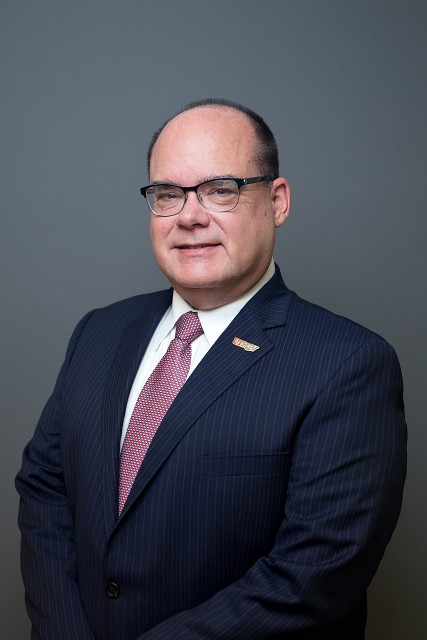Thursday, June 3, 2021
By Karen Villarreal
RIO GRANDE VALLEY, TEXAS – JUNE 3, 2021 – Throughout his medical career Dr. John H. Krouse, dean of UTRGV School of Medicine and Executive Vice President for Health Affairs, has created career opportunities for young physicians and provided words of encouragement when they needed it. Those attributes have led to Krouse being selected for the 2021 Young Physicians Section (YPS) Model Mentor Award by the American Academy of Otolaryngology-Head and Neck Surgery.
This recognition was based on the joint nomination of a group of young physicians who celebrated the role Krouse’s mentorship played in their success.
“I’m quite pleased to be selected as a Model Mentor by the YPS of the academy,” said Krouse. “It’s always been important to me to work with those who are earlier in their career than me.”

The Young Physicians Section is made up of members of the American Academy of Otolaryngology-Head and Neck Surgery who are 40 years of age or younger and have typically been practicing in their careers approximately 10 years. In making their selection, the YPS Governing Council stated that Krouse provided words of encouragement when the young doctors needed it most and went out of his way to create opportunities for their careers.
As Krouse has advanced through various levels of responsibility in his career spanning over 30 years, he has offered mentorship to a range of younger colleagues. During his medical residency, he first provided some guidance to medical school students making their way to their residency stage. Now as a dean he has worked with many former mentees in faculty positions – connecting them with leaders in otolaryngology to further their research, clinical, and professional aspirations, helping with article editing, and providing a comforting ear as their needs and careers widen.
“Mentorship is about listening,” said Krouse. “You have to get a sense of what someone’s goals and strengths are, and what barriers they perceive. A lot of it is helping someone see whether the barriers are real or not, and craft solutions that allow them to achieve their goals.”
Krouse has a special knack for active listening due to his previous experience as a clinical psychologist. This training taught him how to look for emotional cues and how to offer non-judgmental support.
“It’s a big part of what I’ve done. I don’t think you set out to say, ‘I want to be a mentor,’” said Krouse. “It evolves as people feel comfortable with you and more people learn that you’re someone who can do this.”
The nomination submitted for Krouse by his physician mentees explained that his expert mentorship, advocacy, and communication helped them develop a vision for their long-term career arcs that they would not have envisioned otherwise on their own. This is where Krouse said a lot of young physicians need assistance.
“Some have reached a point and are not sure what the next stage is for them,” said Krouse. “Some have well-established goals and come to me because they have identified how I can help them be more successful in achieving those.”
Krouse explains that he usually has up to a half dozen mentees at once, but he doesn’t consider the time that he spends with them to be a burden.
“It’s not very formal a lot of the time – a chat over a cup of coffee. It’s a much more collegial relationship than a formal mentorship hour,” he said. “I don’t have all the answers, but I know how to help them find answers that are important for them.”
In addition to helping with specific problems they may be having, Krouse is determined to instill a few concepts in his mentees that are critical for their success as physicians: flexibility, communication, humility, and work-life balance.
“Life never comes predictably, and you need to learn to be adaptable,” he said. “My life has taken many of those turns. It’s important to realize when barriers are present and how to navigate them.”
Krouse said he is honored to have been recognized with this Model Mentor award as he has always considered mentorship a huge part of his career.
“It gives me great satisfaction when I see people who I work with succeed,” he said. “When you see someone reaching overall satisfaction, you can feel gratified that you had a small part in getting them there.”
Krouse announced in September 2020 that he will be stepping down from his administrative posts to join the School of Medicine faculty. UTRGV recently named Dr. Michael B. Hocker as the new dean of the UTRGV School of Medicine. He starts in his new role on June 28.
ABOUT UTRGV
The University of Texas Rio Grande Valley (UTRGV) was created by the Texas Legislature in 2013 as the first major public university of the 21st century in Texas. This transformative initiative provided the opportunity to expand educational opportunities in the Rio Grande Valley, including a new School of Medicine and a School of Podiatry, and made it possible for residents of the region to benefit from the Permanent University Fund – a public endowment contributing support to the University of Texas System and other institutions.
UTRGV has campuses and off-campus research and teaching sites throughout the Rio Grande Valley including Brownsville (formerly The University of Texas at Brownsville campus), Edinburg (formerly The University of Texas-Pan American campus), Harlingen, Weslaco, McAllen, Port Isabel, Rio Grande City and South Padre Island. UTRGV, a comprehensive academic institution, enrolled its first class in the fall of 2015; the School of Medicine welcomed its first class in the summer of 2016, and the School of Podiatric Medicine in the fall of 2022.
